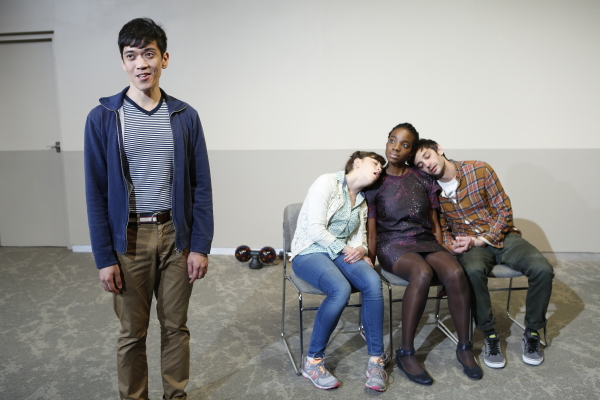The Sonic Life of a Giant Tortoise

(© Carol Rosegg)
Toshiki Okada would like to share a secret: He wants to be a better person, despite the crushing malaise of the culture around him. That's the theme of his short play The Sonic Life of a Giant Tortoise: youth is not the only thing that's sonic, now playing at JACK in a Play Company production. Five characters drift past and occasionally touch base with one another in surreal, fragmented exchanges that reveal their desire to keep life from slipping past them. While some of the play's observations glimmer with insight into its author's mind as well as into Japanese culture, many of the whimsical scenes feel like disorganized meditations that you've probably had yourself at one time or another with a few boozy friends.
Okada uses the five actors (Rachel Christopher, Susannah Flood, Dan Kublick, Jason Quarles, and Moses Villarama) as mouthpieces for dreams, memories, and thoughts on everything from what it would be like to have a dead girlfriend to mourn for, how great it would (or would not) be to travel, and whether one character (Okada himself?) fears his own mortality: "If I were to say whether I am afraid of dying, I'd say that I'm not particularly afraid at all… Do I look like an enlightened person? Or maybe I am actually suicidal?"
Aya Ogawa's quirky translation doesn't help us to better understand the material ("What I'm about to say is something I've thought about in my head"), leaving us to wonder whether Okada is being serious or tongue-in-cheek. His characters do seem in earnest when they say that everyday life oppresses them. They are searching for a way to escape the lethargic "giant tortoise" of modern life, which goes by very fast (at "sonic" speed) when the days are unfulfilling.
But Sonic Life plods aimlessly and slowly, like the tortoise of its title, from one scene to the next, rambling with a banal stream-of-consciousness, and pausing with oppressively long silences between lines of dialogue that make one wonder whether director Dan Rothenberg has inserted them or the cast is improvising (they're not).
Ultimately, Okada echoes pretty much what anyone who has lived in a modern society — Japanese, American, or otherwise — would agree with. Yes, sometimes people do feel trapped by their lives, and settling down is a kind of resignation. But this is hardly new. Unfortunately, Okada has relatively little to say about the potentially suffocating, isolating influence of current technology. Only at the end do we see one of his characters staring blankly into a computer screen and languidly clicking a mouse, a tableau that would have been avant-garde 30 or more years ago, but today feels like an afterthought. We've seen and heard this sort of thing before, making us wish that this tortoise had run the race just a little bit faster.











